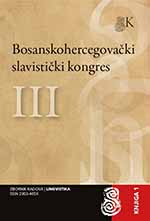Nominalizacija i dekompozicija predikata u savremenom bosanskom jeziku
Nominalisation and Decomposition of Predicates in the Contemporary Bosnian Language
Author(s): Emina HadžićSubject(s): Language and Literature Studies, Morphology, Syntax, South Slavic Languages
Published by: Slavistički komitet BiH
Keywords: decomposition; nominalisation; sentence condensation; verb; verb noun; predicate;
Summary/Abstract: Nominalisation (turning verbs – actions or events – into nouns – things, concepts or people) in language is the occurrence that nominal/noun constructions occur in a sentence instead of verbs. Hence, instead of the expected verb predicate, the speaker uses some of the phrasal verbs or the verb noun (gerund) instead of a transitive verb. In the linguistic practice, constructions such as make mistake are used instead of mistake, make a decision instead of decide, give speech instead of speak, lead debate instead of debate, ask questions instead of question... This phenomenon is, as a rule, characteristic of the administrative style (constructions such as making changes, submitting a report, expressing pleasure, etc.), and it is increasingly represented in journalism, but it is also more and more presented in the conversational style, where it is not natural to use such constructions. So this phenomenon is also taking place in contexts where it is really excessive. – we often hear a car mechanic repairing, not repairing a car, a dentist does a tooth extraction, does not extract a tooth, an athlete performs a shot and does not kick... As a rule, decomposition is mainly used when we want to avoid giving information about the doer of the action, or to emphasize anonymity. The use of nominated statements relates to situations and spheres of communication in which static, impersonal, abstract information is presented, while the action, the specific doer of the action, the conditions under which the action takes place are less relevant. Although nominalising and decomposing of predicates are not linguistic phenomena that are negative and wrong, we should still be careful using nominalised constructions, and I recommend when it is possible to use transitive verbs insted of phrasal verbs or gerund.
Journal: Bosanskohercegovački slavistički kongres
- Issue Year: III/2022
- Issue No: 1
- Page Range: 201-211
- Page Count: 11
- Language: Bosnian

